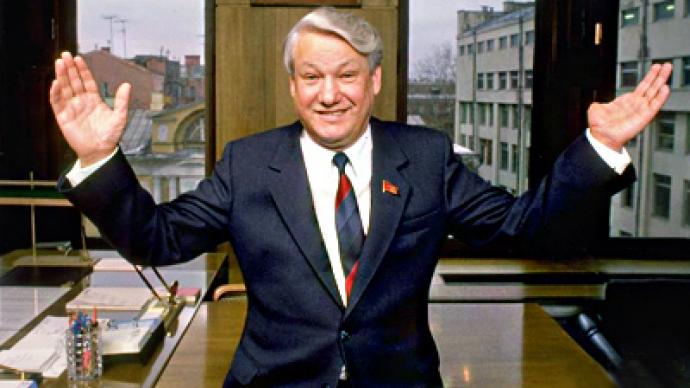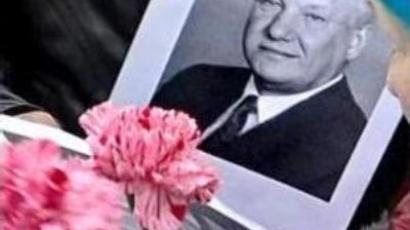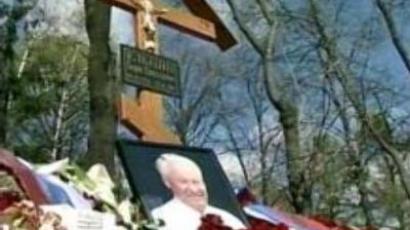Yeltsin: epitome of 1990s Russia remembered

Russia is marking the 80th birthday of the man who took Perestroika to another level when the Soviet Union dissolved - Boris Yeltsin.
Starting early in the morning, people began laying flowers at the first Russian president’s grave at Moscow’s Novodevichy cemetery.Yeltsin's family traveled from his home town of Ekaterinburg to join those paying their respects.
Four years after his death, the first President of Russia is remembered for his reforms, free market aspirations and privatization policies.Yeltsin’s 80th birthday is being celebrated with much greater pomp than his 70th – a whole series of events are planned throughout the country: rock concerts, a tennis [Yeltsin’s favorite game] tournament for children to name just a few. Certainly the main event is Tuesday’s unveiling of a white marble obelisk dedicate to him in Ekaterinburg where he lived for most of his life. It was in Ekaterinburg that he gained a university degree and got married. He advanced through the Communist Party ranks up to the very top. The only other Yeltsin monument is on his grave at Novodevichy cemetery.A Boris Yeltsin memorial center has also been opened – a tradition borrowed from the US, where there is a wide net of presidential libraries dedicated to the legacies of former presidents. The Yeltsin center will be dedicated to the promotion of civil society and human rights.Boris Yeltsin will always remain a very polarizing figure for Russian society. He is generally credited for bringing democracy to Russia. Both of his successors, Vladimir Putin and Dmitry Medvedev commended him for making Russian democracy irreversible. He was also known for overseeing a major transition of the world’s largest command economy into a free market but all of his reforms came at a very high price for Russia.During his rule, Russia’s external debt increased by 60 per cent and the suicide rate increased by 70 per cent. For most Russia’s citizens the transition period turned into a nightmare. Yeltsin is blamed for not preventing the collapse of the Soviet Union, something that the overwhelming majority of citizens were against and voted against during a specially organized referendum. For most people the blow of the reforms was too hard and Yeltsin was blamed for not softening it.The latest polls suggest that as time goes by Russians tend to forget the bad and are growing a little bit more sympathetic for the first Russian president.According to the Levada-center, an independent polling organization, the number of those who viewed Yeltsin’s legacy in a negative light has decreased from some 60 per cent in 2000 to 35 per cent in 2011, while the percentage of positive opinions about his reforms has correspondingly grown.The current President of Russia, Dmitry Medvedev, attended the monument’s unveiling ceremony and will be presiding during a meeting of a council dedicated to civil society and human rights.
“The path of our first president was a very difficult one. Every single citizen of our country realizes this today. The first president always has his work cut out for him. He needs to change the entire political system and this was the fate that befell Boris Yeltsin. We must admit that he was up to the task and stood his ground honorably,” Dmitry Medvedev said. “The modern, but not perfect, country we live in today was created thanks to Boris Yeltsin and everyone who helped him to build the foundation of a new nation.”
Boris Yeltsin himself never doubted he would live to celebrate his 100th birthday but instead his widow has to fight back tears while opening an exhibition timed to what would have been his 80th birthday.In nearly four years since Boris Yeltsin's death, the agony of loss has given way to quiet remembrance.“He really liked family gatherings, birthdays. We usually celebrated with our daughters,” remembers the first president’s widow Naina Yeltsina.Most of the photos exhibited at a photographic exhibition coinciding with the anniversary show Yeltsin in his early years in power when he had the backing of almost the entire country. When voicing your political position was still an act of novelty and courage and when hopes of a different life in a better country were still untainted by the harsh reality.The war in Chechnya, which Yeltsin himself admitted was a mistake, the banking crisis that would cripple the already impoverished population – all that would come later. And as some argue, would unfairly obscure all the good that Yeltsin had done.Yeltsin's press secretary Sergey Yastrzhembsky believes that “Anything large is better perceived from a distance, especially in history. I think we still need more time for the emotions and trifles to give way to serious analysis of what a titanic figure Yeltsin really was.”Vladimir Shevchenko served as his head of protocol for more than eight years.And while Yeltsin's explosive character and unpredictable temperament often contravened the dry rules of diplomatic engagement, Vladimir says he had never had a better boss.“He never thwarted a single event and he was never late. But emotionally he could be absolutely unpredictable and do what no one expected him to do like his famous conducting of an orchestra, for example,” Vladimir Shevchenko, head of Yeltsin's protocol, remembers. “And again, he was overwhelmed by emotions. He turned his head and saw that Shevchenko was the only one who was objecting and dragging him away. All the other people around him were applauding.”He was ushered into power by the great hopes of his people and left office full of regret for not fulfilling all of them. And it was only after Yeltsin passed away that his country could start to examine his legacy in all its complexity.Boris Yeltsin's 70th birthday was celebrated with far fewer accolades. But one decade later even those who used to criticize him very harshly are growing a bit more gracious in their assessment of his character and his policies because even they have also come to realize that, with all his ups and downs, Yeltsin was the very epitome of Russia in the 1990s.
A deputy director of the Yeltsin Foundation, Evgeny Volk, says that Yeltsin managed to demolish the totalitarian cabinet system which represented the dramatic threat for both sides – Russian citizens and the whole world, and that it took Russia-US relations to a new level.“I think that Yeltsin has over-wisely rejected the legacy of the Cold War. The American-Russian relationship was based on the “zero-some” game, which meant what is good for Russia, for the Soviet Union, was meant to be bad for America. Otherwise, what was good for the United States was interpreted to be bad for Russia. Yeltsin established a cooperative kind of relationship with Washington. He had a personal friendship with American president Bill Clinton. And he made Russia a part of the civilized international community, establishing a new kind of partnership with the United States.”
The first Russian president was never ever under pressure from anyone, points out Leon Aron, the director of Russian Studies at the American Enterprise Institute and the author of a book on Boris Yeltsin. While he was in office, it was a time of complete media freedom and it was a time of unimpeded access to the electoral process for the opposition in terms of formation of parties and candidates running in the elections.“Yeltsin allowed free and fair elections, including two referendums, three general elections and the presidential election, which were considered by both the opposition and the international observers completely free and fair," said Aron.“It is most impressive that even after the armed rebellion in Moscow, in October 1993, within two weeks Yeltsin lifted all the censorship on the opposition media and also allowed all the parties which participated in the rebellion – with the exception of five radical ones – to actually participate in the elections to the newly established parliament,” Aron explained, reminding that “everybody was allowed, including the opposition, to the counting of the votes.”
Political analyst from Russia's Kommersant newspaper Sergey Strokan says even though Russia remains divided over Yeltsin’s controversial legacy, it is hard to underestimate what the first president of Russia did for the country.“It’s equally true that we’ve managed to undergo those tests and re-emerged as a strong power. And at present when we speak about President Medvedev and his modernization drive I see certain similarity with what Yeltsin was doing, because Yeltsin was also a reformer, a modernizer of Russia”, believes Strokan.














